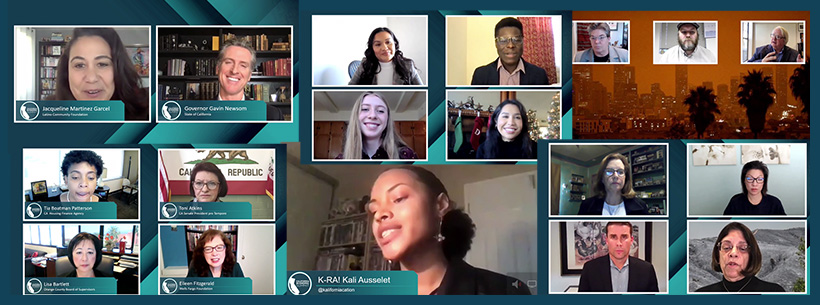
Equity must be a vital part of how California recovers from the COVID-19 pandemic according to Governor Newsom as he addressed the second day of the 2020 California Economic Summit. “We had a growth agenda [before the pandemic], but we didn’t have an inclusion agenda. We have to reconcile the wealth disparities, the income inequalities and the issues that have only been accelerated through the lens of this pandemic.”
Newsom emphasized the state’s economy will continue to lead the country. “The future happens here first,” he said, noting that California’s number one export now is electric cars and that 33 electric vehicle manufacturers are headquartered in California. But Newsom also added, “Businesses can’t thrive in a world that’s failing,” pointing out that California is as well-positioned as it can be for the current COVID-19 “surge on top of a surge” with an adequate supply of masks and ventilators and the creation of eleven new surge facilities.
The second day of the virtual Summit focused on Building a Better California for All – that includes engaging young leaders and the next generation, and continuing the efforts of CA FWD and its partners in making sure all Californians have access to broadband and home ownership, and ensuring the state’s natural landscapes are resilient.
During today’s Bridging the Digital Divide panel, Assembly Member Cecilia Aguiar-Curry (D-Winters) announced today that she will introduce the Internet for All Act of 2021 on Monday, December 7. This bill with bi-partisan and bi-cameral support will provide funding and bonds to ensure that all Californians will be able to access the internet. “In reality, one in eight California homes still do not have internet access and communities of color face even higher numbers of students and families who remain disconnected.”
“High speed internet is not a partisan issue,” agreed Senator Mike McGuire (D-Healdsburg). “It’s an issue of equity and should be a California value.”
Stephanie Tom, deputy director for broadband and digital Literacy at the California Department of Technology, announced the final draft of the plan for Governor Newsom’s Broadband for All Executive Order will be ready next week.
At the Affordable Home Ownership panel, participants agreed that increasing homeownership in California needs to be viewed through the lens of equity and inclusion — and not just as a housing issue. Black and brown ownership of homes in the state is historically low. California Senate Pro Tem Toni Atkins (D-San Diego) pledged to continue her leadership on the issue — saying that a group of housing bills will be introduced when the California Legislature convenes next week. Included will be the re-introduction of a bill that would end restrictive single-family zoning statewide.
Orange County Supervisor Lisa Bartlett talked about the necessity to identify creative and innovative ways to address the need for affordable housing at the local level, citing an example in her county, where the median home price is $800,000, that has identified 3,000 parcels of land that could be used for workforce housing where workers will stay near where they work.
Eileen Fitzgerald of the Wells Fargo Foundation reviewed a number of programs from across the country focused on increasing black and brown homeownership, including many that help people meet the important issue of accumulating enough money for a down payment. Tia Boatman Patterson of the California Housing Finance Agency said there are some 3,000 down payment assistance programs in the state. It’s a complex issue, and the Summit will be releasing some policy solutions on increasing homeownership early in 2021.
During the Forest Resiliency session moderated by Dr. Glenda Humiston, vice president of University of California Agriculture and Natural Resources, Steve Frisch, president and CEO, Sierra Business Council and Bill Tripp, deputy director of Eco-Cultural Revitalization, Karuk Tribe discussed the urgent need to develop a clear strategy on forest management and resiliency in the face of a rapidly changing climate.
“This is an urban and rural issue. This is something we have to be working on together,” said Humiston who also reminded the audience of the California’s Wildfire Crisis: A Call to Action, which includes a call to develop innovative wood product industries that could build up rural economies while creating more healthy forests.
Tripp added the value of respecting cultural use of fire and encouraged the conversation to move from a context of fear to leverage its power in a productive way. Frisch called for state and local government commitment to address this issue and called out the importance of leveraging public sector and philanthropic investments. “If we don’t start getting a handle on this problem, the four million acres we saw this year will be a drop in the bucket,” he added.
The popularity of the first ever panel focusing on the State’s youth at 2019 Summit led to the formation of the CA FWD Young Leaders Advisory Council and a larger voice for youth this year on issues ranging from climate change to broadband access to the future of California.
The “Next Generation of Leaders” panel also offered advice to their older peers on how to engage with the younger generation. PolicyWise Podcast host Michael Wiafe asked the audience to “be intentional about the inclusion of the diversity of voices.” University of California Riverside student Jade Magaña added, “See youth as an asset in these conversations, because we do want to participate in government, and we do want to create a positive impact.”
This year, 800 elected, business and civic leaders participated in the two-day 2020 California Economic Summit. You can find yesterday’s round-up here.
Join us for the 2021 California Economic Summit in Monterey!

